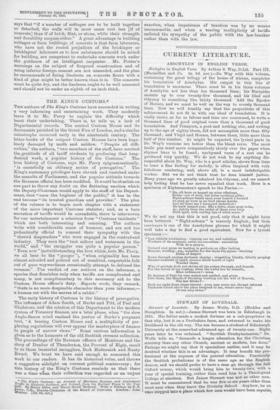CURRENT LITERATURE.
AESCHYLUS IN ENGLISH VERSE.
Zschylus in English Verse. By Arthur S. Way, D.Lit. Part III. (Macmillan and Co. 3s. 6d. net.)—.-Dr. Way with this volume, containing the great trilogy of the house of Atreus, completes his translation of Aeschylus. His output in this lino of translation is enormous. There must be in his three volumes of Aeschylus not loss than ten thousand lines ; his Euripides mounts up to over twenty-five thousand, and his Iliad and Odyssey to something like thirty thousand. Add the Epodes of Horace, and we must be well on the way to seventy thousand lines. Now we will frankly say that the proportions of this achievement do not fit in with our ideal of translation. It is really easier, as far as labour and time are concerned, to write a. thousand lines of good original verse than a thousand of good translation. And Tennyson, a poet and nothing else, and writing up to the age of eighty-three, did not accomplish more than fifty thousand ; and Virgil and Horace, between them, little more than half of this number. As might be expected, the lyrical parts in Dr. Way's versions are better than the blank verse. The most facile pen must move comparatively slowly over the paper when rhymes have to be found ; unrhymed verse of a sort can be produced very quickly. We do not wish to say anything dis- respectful about Dr. Way, who is a good scholar, shows from time to time a fine feeling for melody, is often inspired with veiy felicitous rendering, and, above all, is a most indefatigable worker. But we do not think that he does himself justice. Many years ago we greatly admired his Odyssey, and we cannot help fooling that he has never equalled that work. Hero is a specimen of Klytemnestra's speech to the Furies :— " Hs, oft have ye lapped up mine offerings, Bowls—not of wine, but sober soothing gifts; Night.solemn feasts upon your hearth I burned At such an hour as no God claims beside. And all these see I trampled underfoot I lie bath 'seeped you; like a fawn, clean gone is he, Ay, lightly from the midst of them) your toils Rath sped, with curling lips of utter scorn."
We do not say that this is not good, only that it might have been bettered. "Night-solemn" is scarcely English •; but then vtmoiceuva is one of the Aeschylean phrases for which it might well take a day to find a good equivalent. Now for a lyrical specimen
Law abideth everlasting: cunning are we, and unfailing Workers of its sentence, awful sin-recorders: unavailing With us is prayer. Onward over press we basting to perform an office lacking Honour, worship—yea, unlawful for the Gods Olympian—tracking Paths of despair Down through sunless darkness sloping : stumbling blindly, blindly groping Sinners uubereft of sight, sinners death-bereft of light Wander there.
Who of mortals By decrees of Fate for ever sealed and ratified, and given Into these, the Hands of Dooming working out the will of Heaven, The law divine ?— Such my right from times eternal: none may scorn me, though infernal Darkness brood above the place assigned to me, where never rays Of sun may shine."
























































 Previous page
Previous page